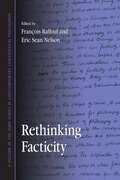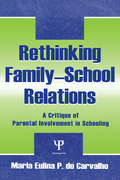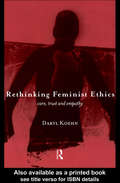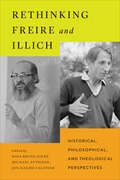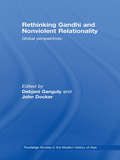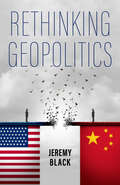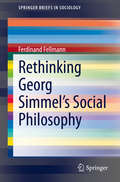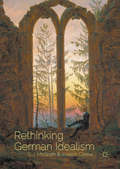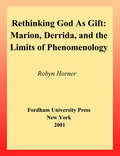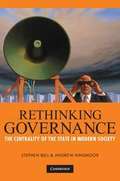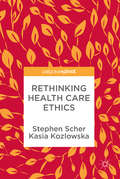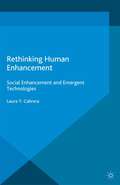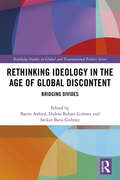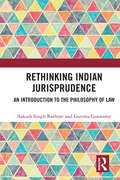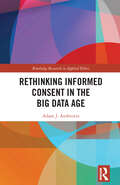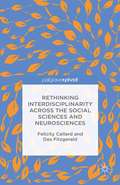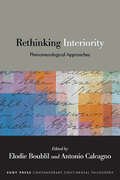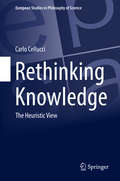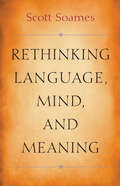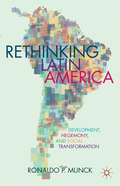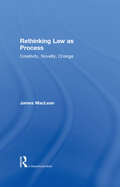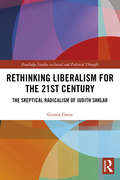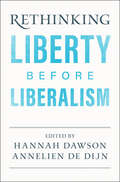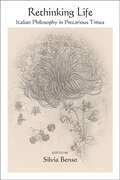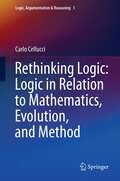- Table View
- List View
Rethinking Facticity (Suny Series In Contemporary Continental Philosophy Ser.)
by François Raffoul Eric Sean NelsonExamines the historical context and contemporary relevance of facticity.
Rethinking Family-school Relations: A Critique of Parental involvement in Schooling (Sociocultural, Political, and Historical Studies in Education)
by Maria Eulina de CarvalhoThis book addresses the complications and implications of parental involvement as a policy, through an exploratory theoretical approach, including historical and sociological accounts and personal reflection. This approach represents the author's effort to understand the origins, meanings, and effects of parental involvement as a prerequisite of schooling and particularly as a policy 'solution' for low achievement and even inequity in the American educational system. Most of the policy and research discourse on school-family relations exalts the partnership ideal, taking for granted its desirability and viability, the perspective of parents on specific involvement in instruction, and the conditions of diverse families in fulfilling their appointed role in the partnership. De Carvalho takes a distinct stance. She argues that the partnership-parental ideal neglects several major factors: It proclaims parental involvement as a means to enhance (and perhaps equalize) school outcomes, but disregards how family material and cultural conditions, and feelings about schooling, differ according to social class; thus, the partnership-parental involvement ideal is more likely to be a projection of the model of upper-middle class, suburban community schooling than an open invitation for diverse families to recreate schooling. Although it appeals to the image of the traditional community school, the pressure for more family educational accountability really overlooks history as well as present social conditions. Finally, family-school relations are relations of power, but most families are powerless. De Carvalho makes the case that two linked effects of this policy are the gravest: the imposition of a particular parenting style and intrusion into family life, and the escalation of educational inequality. Rethinking Family-School Relations: A Critique of Parental Involvement in Schooling--a carefully researched and persuasively argued work--is essential reading for all school professionals, parents, and individuals concerned with public schooling and educational equality.
Rethinking Feminist Ethics: Care, Trust and Empathy
by Daryl KoehnThe question of whether there can be a distinctively female ethics is one of the most important and controversial debates in gender studies, philosophy and psychology today. Rethinking Feminist Ethics; Care, Trust and Empathy marks a bold intervention in these debates and bridges the ground between women theorists disenchanted with aspects of traditional ethics and traditional theories that insist upon the need for some ethical principles.
Rethinking Freire and Illich: Historical, Philosophical, and Theological Perspectives
by Michael Attridge Rosa Bruno-Jofré Jon Igelmo ZaldívarMarking the fiftieth anniversary of two of the most influential books in modern educational and social theory, Rethinking Freire and Illich introduces readers to the results of the symposium of Paulo Freire’s Pedagogy of the Oppressed and Ivan Illich’s Deschooling Society. The collection uniquely analyses Freire and Illich together, although not in a comparative way. It acknowledges that both Freire and Illich led in different ways to a new approach to perceiving and understanding the concept of liberation as a human condition, while also presenting current criticisms of their work from a gendered perspective and by Indigenous scholars in the US and Canada. Drawing on contributions from historians of education, theologians, digital experts, and philosophers of education, the book offers a historical analysis using extensive primary sources and an originality of topics. It introduces the ways in which the current generation reads the overall works of Freire and Illich in the search for a reconstructed democratic education. As a result, Rethinking Freire and Illich presents Freire and Illich in light of contemporary issues in this generation, and offers renewed searches for a good and just life and a reconstructed democratic education.
Rethinking Gandhi and Nonviolent Relationality: Global Perspectives (Routledge Studies in the Modern History of Asia)
by Debjani Ganguly John DockerThis book presents a rethinking of the world legacy of Mahatma Gandhi in this era of unspeakable global violence. Through interdisciplinary research, key Gandhian concepts are revisited by tracing their genealogies in multiple histories of world contact and by foregrounding their relevance to contemporary struggles to regain the ‘humane’ in the midst of global conflict. The relevance of Gandhian notions of ahimsa and satyagraha is assessed in the context of contemporary events, when religious fundamentalisms of various kinds are competing with the arrogance and unilateralism of imperial capital to reduce the world to a state of international lawlessness. Covering a wide and comprehensive range of topics such as Gandhi’s vegetarianism and medical practice, his successes and failures as a litigator in South Africa, his experiments with communal living and his concepts of non-violence and satyagraha. The book combines historical, philosophical, and textual readings of different aspects of the leader’s life and works. Rethinking Gandhi in a New World Order will be of interest to students and academics interested in peace and conflict studies, South Asian history, world history, postcolonial studies, and studies on Gandhi.
Rethinking Geopolitics
by Jeremy BlackAmid the bloody Russian invasion of Ukraine in 2021 and the escalating tensions across the Taiwan Strait, the geopolitical balance of power has changed significantly in a very short period. If current trends continue, we may be witnessing a tectonic realignment unseen in more than a century.In 1904, Halford Mackinder delivered a seminal lecture entitled "The Geographical Pivot of History" to a packed house at the Royal Geographical Society in London about the historic changes then taking place on the world stage. Britain was the great power of that historical moment, but its political, military, and economic primacy was under serious challenge from the United States, Germany, and Russia. Mackinder predicted that the "heartland" of Eastern Europe held the key to global hegemony and that the struggle for control over this region would be the next great conflict. Ten years later, when an assassin's bullet in Sarajevo launched the world into a calamitous war, Mackinder's analysis proved prescient. As esteemed historian Jeremy Black argues in this timely new volume, the 2020s may be history's next great pivot point. The continued volatility of the global system in the wake of a deadly pandemic exacerbates these pressures. At the same time, the American public remains divided by the question of engagement with the outside world, testing the limits of US postwar hegemony. The time has come for a reconsideration of the 120 years from Mackinder's lecture to now, as well as geopolitics of the present and of the future.
Rethinking Georg Simmel's Social Philosophy (SpringerBriefs in Sociology)
by Ferdinand FellmannThis textbook examines interaction, reciprocity, dualism, conflict, and personality in the work of Georg Simmel. These themes, which made Simmel the founder of relational sociology, are presented uniquely in the light of intimate relations. According to Simmel, intimate relations rather than the individual constitute the fundamental stratum of human culture. By relating objective social facts to subjective experience, Simmel also opened up a new way of understanding human life in the early 20th century. Using Simmel’s theory of reciprocity, this book follows an innovative method of interpretation, providing a quantitative perspective of lived experience. This book analyzes Simmel’s ideas from the viewpoint of modern hermeneutical philosophy and sociology. Fellmann expertly presents the historical context of Simmel’s concepts, and their influence on other sociologists and philosophers, especially in Germany. Written in an engaging style, this book is suitable as a core text in undergraduate and graduate courses on sociological theory and continental philosophy. Additionally, given the new focus on Simmel and intimate relations, the book is of interest to scholars of relational sociology, history of sociology, continental philosophy, history of philosophy, philosophy of culture, and philosophical anthropology.
Rethinking German Idealism
by S. J. Mcgrath Joseph CarewThe 'death' of German Idealism has been decriedinnumerable times since its revolutionary inception, whether it be by the 19th-centurycritique of Western metaphysics, phenomenology, contemporary French philosophy,or analytic philosophy. Yet in the face of two hundred years ofsustained, extremely rigorous attempts to leave behind its legacy, German Idealismhas resisted its philosophical death sentence. Forthis exact reason it is timely ask: What remains of GermanIdealism? In what ways does its fundamental concepts and texts still speak tous? Drawingtogether new and established voices from scholars in Kant, Fichte, Hegel,and Schelling, this volume offers a fresh look on this time-honouredtradition. It uses myriad of recently developed conceptual tools to present new and challenging theories of its now canonical figures.
Rethinking God as Gift: Marion, Derrida, and the Limits of Phenomenology (Perspectives in Continental Philosophy)
by Robyn HornerRethinking God as Gift is situated at the intersection of philosophy, critical theory and theology. The first sustained study of the work of Jean-Luc Marion in English, it offers a unique perspective on contemporary questions and their theological relevance. Taking its point of departure from the problem of the gift as articulated by Jacques Derrida, who argues that the conditions of possibility of the gift are also its conditions of impossibility, Horner pursues a series of questions concerning the nature of thought, the viability of phenomenology, and, most urgently, the possibility of grace. For Marion, phenomenology, as the thought of the given, offers a path for philosophy to proceed without being implicated in metaphysics. His retrieval of several important insights of Edmund Husserl, along with his reading of Martin Heidegger and Emmanuel Lévinas, enables him to work out a phenomenology where even “impossible” phenomena such as revelation and the gift might be examined. In this important confrontation between Marion and Derrida issues vital to the negotiation of postmodern concerns in philosophy and theology emerge with vigour. The careful elucidation of those issues in an interdisciplinary context, and the snapshot it provides of the state of contemporary debate, make Rethinking God as Gift an important contribution to theological and philosophical discussion.
Rethinking Governance
by Stephen Bell Andrew HindmoorSeveral problems plague contemporary thinking about governance, from the multiple definitions that are often vague and confusing, to the assumption that governance strategies such as networks and markets represent attempts by Weakening states to maintain control.
Rethinking Health Care Ethics
by Stephen Scher Kasia KozlowskaThe goal of this open access book is to develop an approach to clinical health care ethics that is more accessible to, and usable by, health professionals than the now-dominant approaches that focus, for example, on the application of ethical principles. The book elaborates the view that health professionals have the emotional and intellectual resources to discuss and address ethical issues in clinical health care without needing to rely on the expertise of bioethicists. The early chapters review the history of bioethics and explain how academics from outside health care came to dominate the field of health care ethics, both in professional schools and in clinical health care. The middle chapters elaborate a series of concepts, drawn from philosophy and the social sciences, that set the stage for developing a framework that builds upon the individual moral experience of health professionals, that explains the discontinuities between the demands of bioethics and the experience and perceptions of health professionals, and that enables the articulation of a full theory of clinical ethics with clinicians themselves as the foundation. Against that background, the first of three chapters on professional education presents a general framework for teaching clinical ethics; the second discusses how to integrate ethics into formal health care curricula; and the third addresses the opportunities for teaching available in clinical settings. The final chapter, "Empowering Clinicians", brings together the various dimensions of the argument and anticipates potential questions about the framework developed in earlier chapters.
Rethinking Human Enhancement: Social Enhancement and Emergent Technologies
by Laura Y. CabreraThis book discusses three possible human enhancement paradigms and explores how each involves different values, uses of technology, and different degrees and kinds of ethical concerns. A new framework is advanced that promotes technological innovation that serves the improvement of the human condition in a respectful and sustainable way.
Rethinking Ideology in the Age of Global Discontent: Bridging Divides (Routledge Studies in Global and Transnational Politics)
by Barrie Axford Didem Buhari-Gulmez Seckin Baris GulmezOver the last decade, anti-government demonstrations worldwide have brought together individuals and groups that were often assumed unlikely to unite for a common cause due to differences in ideological tendencies. They have particularly highlighted the role of youth, women, social media, and football clubs in establishing unusual alliances between far left and far right groups and/or secular and religious segments of the society. In this wide-ranging volume, the contributors question to what extent political ideologies have lost their explanatory power in contemporary politics and society. This book aims to contribute to the ongoing debates about the relationship between ideology and public protests by introducing the global context that allows the comparison of societies in different parts of the world in order to reveal the general patterns underlying the global era. Tackling a highly topical issue, this book will be of particular interest to students and scholars of international relations, social movements and globalization.
Rethinking Indian Jurisprudence: An Introduction to the Philosophy of Law
by Aakash Singh Rathore Garima GoswamyWhat is law? What is the source of law? What is the law for? How does law differ from other norms or codes of conduct? What is the difference between law and morality? Who is obligated to follow the law and why? What is the difference between moral and legal obligation? This book addresses these foundational questions about the law in general, and seeks to reorient our thoughts to the specific nature of law in India, the India of today, and the possible India of the future. This volume: covers relevant foundational elements, concepts and questions of the discipline; brings the uniqueness of Indian Philosophy of Law to the fore; critically analyzes the major theories of jurisprudence; examines legal debates on secularism, rationality, religion, rights and caste politics; and presents useful cases and examples, including free speech, equality and reservation, queer law, rape and security, and the ethics of organ donation. Lucid and accessible, the book will be indispensable to students, teachers and scholars of law, philosophy, politics as well as philosophy of law, sociology of law, legal theory and jurisprudence.
Rethinking Informed Consent in the Big Data Age (Routledge Research in Applied Ethics)
by Adam J. AndreottaIn the “big data age”, providing informed consent online has never been more challenging. Countless companies collect and share our personal data through devices, apps, and websites, fuelling a growing data economy and the emergence of surveillance capitalism. Few of us have the time to read the associated privacy policies and terms and conditions, and thus are often unaware of how our personal data are being used. This is a problem, as in the last few years, large tech companies have abused our personal data. As privacy self-management, through the mechanism of providing online consent, has become increasingly difficult, some have argued that surveillance capitalism and the data economy more broadly need to be overthrown.This book presents a different perspective. It departs from the concept of revolutionary change to focus on pragmatic, incremental solutions tailored to everyday contexts. It scrutinises how consent is currently sought and provided online and offers suggestions about how online consent practices can be improved upon. These include the possibility of subjecting consent-gathering practices to ethics committees for review; the creation of visual-based consent agreements and privacy policies to help with transparency and engagement; the development of software to protect privacy; and the idea of automated consent functionalities that allow users to bypass the task of reading vast amounts of online consent agreements. The author suggests that these “small-scale” changes to online consent-obtaining procedures could, if successfully implemented, provide us with a way of self-managing our privacy in a way that avoids a revolutionary dismantling of the data economy. In the process, readers are encouraged to rethink the very purpose of providing informed consent online.Rethinking Informed Consent in the Big Data Age will appeal to researchers in normative ethics, applied ethics, philosophy of law, and the philosophy of AI. It will also be of interest to business scholars, communication researchers, students, and those in industry.
Rethinking Interdisciplinarity across the Social Sciences and Neurosciences
by F. Callard D. FitzgeraldThis book offers a provocative account of interdisciplinary research across the neurosciences, social sciences and humanities. Rooting itself in the authors' own experiences, the book establishes a radical agenda for collaboration across these disciplines. This book is open access under a CC-BY license.
Rethinking Interiority: Phenomenological Approaches (SUNY series in Contemporary Continental Philosophy)
by Elodie Boublil; Antonio CalcagnoA philosophical exploration of the concept of interiority, Rethinking Interiority presents readers with its unmined aspects and senses, including ideas of an inner world and life, personal identity, auto-affection, and its social and political dimensions as well as its ethical possibilities. Internationally recognized scholars and philosophers investigate figures in the history of phenomenology as well as recent developments in psychology and the neurosciences to uncover not only the depths of interiority but also how it comes to connect with and structure external reality. Western and Eastern philosophical positions are addressed, creating a fruitful dialogue in which readers are invited to participate.
Rethinking Knowledge
by Carlo CellucciThis monograph addresses the question of the increasing irrelevance of philosophy, which has seen scientists as well as philosophers concluding that philosophy is dead and has dissolved into the sciences. It seeks to answer the question of whether or not philosophy can still be fruitful and what kind of philosophy can be such. The author argues that from its very beginning philosophy has focused on knowledge and methods for acquiring knowledge. This view, however, has generally been abandoned in the last century with the belief that, unlike the sciences, philosophy makes no observations or experiments and requires only thought. Thus, in order for philosophy to once again be relevant, it needs to return to its roots and focus on knowledge as well as methods for acquiring knowledge. Accordingly, this book deals with several questions about knowledge that are essential to this view of philosophy, including mathematical knowledge. Coverage examines such issues as the nature of knowledge; plausibility and common sense; knowledge as problem solving; modeling scientific knowledge; mathematical objects, definitions, diagrams; mathematics and reality; and more. This monograph presents a new approach to philosophy, epistemology, and the philosophy of mathematics. It will appeal to graduate students and researchers with interests in the role of knowledge, the analytic method, models of science, and mathematics and reality.
Rethinking Language, Mind, and Meaning
by Scott SoamesIn this book, Scott Soames argues that the revolution in the study of language and mind that has taken place since the late nineteenth century must be rethought. The central insight in the reigning tradition is that propositions are representational. To know the meaning of a sentence or the content of a belief requires knowing which things it represents as being which ways, and therefore knowing what the world must be like if it is to conform to how the sentence or belief represents it. These are truth conditions of the sentence or belief. But meanings and representational contents are not truth conditions, and there is more to propositions than representational content. In addition to imposing conditions the world must satisfy if it is to be true, a proposition may also impose conditions on minds that entertain it. The study of mind and language cannot advance further without a conception of propositions that allows them to have contents of both of these sorts. Soames provides it.He does so by arguing that propositions are repeatable, purely representational cognitive acts or operations that represent the world as being a certain way, while requiring minds that perform them to satisfy certain cognitive conditions. Because they have these two types of content--one facing the world and one facing the mind--pairs of propositions can be representationally identical but cognitively distinct. Using this breakthrough, Soames offers new solutions to several of the most perplexing problems in the philosophy of language and mind.
Rethinking Latin America
by Ronaldo MunckLatin America is assuming an increasingly important position on the world stage with its heterodox economic policies and bold political experiments attracting world-wide attention in an era characterized by a general crisis of perspectives. Since European colonization from 1500 onwards, the region has played a key role in the modernization and enrichment of Europe and the West. Today, the West is in crisis and the whole Enlightenment discourse is thrown into question. Is it possible that Latin America now shows the West where it is heading? With complex, dynamic, conflictual, but, above all, original processes of development - and with new visions of social transformation and new constructions of hegemony - the region offers a fascinating laboratory for the rest of the world and, maybe, a mirror of the future.
Rethinking Law as Process: Creativity, Novelty, Change
by James MacLeanFirst published in 2013. Routledge is an imprint of Taylor & Francis, an informa company.
Rethinking Liberalism for the 21st Century: The Skeptical Radicalism of Judith Shklar (Routledge Studies in Social and Political Thought)
by Giunia GattaRethinking Liberalism for the 21st Century offers an indispensable reexamination of the life, work, and interventions of a prominent liberal political theorist of the 20th century: Judith Shklar. Drawing on published and unpublished sources including Shklar’s correspondence, lecture notes, and other manuscripts, Giunia Gatta presents a fresh theoretical interpretation of Shklar’s liberalism as philosophically and politically radical. Beginning with a thorough reconstruction of Shklar’s life and her interest in political theory, Gatta turns her attention to examining the tension between Shklar’s critique of the term "modernity" and her passion for Enlightenment thinkers, including Rousseau and Hegel. In the second part of the book, Gatta roots Shklar’s liberalism of permanent minorities in her work in the history of political thought, and highlights this contribution as a fundamental recasting of liberalism as the political philosophy of outsiders. She makes a compelling argument for a liberalism of permanent minorities that refuses to stand on the ground of firm foundations and, instead, is oriented by complex understandings of cruelty and fear. Rethinking Liberalism for the 21st Century is a much-needed reorientation of traditional liberal policies, allowing for a more meaningful intervention in many contemporary debates. As such, it will be of interest to scholars of political theory, the history of political thought and ideas, philosophy, international relations, and political science in general.
Rethinking Liberty before Liberalism
by Hannah Dawson Annelien De DijnOpens up new histories of freedom and republicanism by building on Quentin Skinner's ground-breaking Liberty before Liberalism nearly twenty five years after its initial publication. Leading historians and philosophers reveal the neo-Roman conception of liberty that Skinner unearthed as a normative and historical hermeneutic tool of enormous, ongoing power. The volume thinks with neo-Romanism to offer reinterpretations of individual thinkers, such as Montaigne, Grotius and Locke. It probes the role of neo-Roman liberty within hierarchies and structures beyond that of citizen and state – namely, gender, slavery, and democracy. Finally, it reassesses the relationships between neo-Romanism and other languages in the history of political thought: liberalism, conservatism, socialism, and the human rights tradition. The volume concludes with a major reappraisal by Skinner himself.
Rethinking Life: Italian Philosophy in Precarious Times (SUNY series in Contemporary Italian Philosophy)
by Silvia BensoThis volume gathers fourteen contributions written by Italian philosophers within the context of the precariousness and vulnerability revealed by the Covid-19 pandemic. The pandemic compels us to rethink what is affected most by this global occurrence yet does not end with it—that is, life. Beyond the geographical, socio-political, and medical contexts in which the reflections originate, Rethinking Life is deeply utopian, presenting aspirations toward a different configuration of life and collective living centered on relational subjectivities, interconnectedness, interdependence, and, ultimately, solidarity. How does the pandemic—what it represents and exposes—call us to rethink our notion of life? How does an episode of morbidity affect a fuller understanding of life? Can such a hermeneutic shift be dared and sustained? The sobriety of the reflections yields elegant, incisive, and direct prose of profound effect and immediacy—and a captivating, lucid, and thought-provoking narrative.
Rethinking Logic: Logic in Relation to Mathematics, Evolution, and Method
by Carlo CellucciThis volume examines the limitations of mathematical logic and proposes a new approach to logic intended to overcome them. To this end, the book compares mathematical logic with earlier views of logic, both in the ancient and in the modern age, including those of Plato, Aristotle, Bacon, Descartes, Leibniz, and Kant. From the comparison it is apparent that a basic limitation of mathematical logic is that it narrows down the scope of logic confining it to the study of deduction, without providing tools for discovering anything new. As a result, mathematical logic has had little impact on scientific practice. Therefore, this volume proposes a view of logic according to which logic is intended, first of all, to provide rules of discovery, that is, non-deductive rules for finding hypotheses to solve problems. This is essential if logic is to play any relevant role in mathematics, science and even philosophy. To comply with this view of logic, this volume formulates several rules of discovery, such as induction, analogy, generalization, specialization, metaphor, metonymy, definition, and diagrams. A logic based on such rules is basically a logic of discovery, and involves a new view of the relation of logic to evolution, language, reason, method and knowledge, particularly mathematical knowledge. It also involves a new view of the relation of philosophy to knowledge. This book puts forward such new views, trying to open again many doors that the founding fathers of mathematical logic had closed historically.
